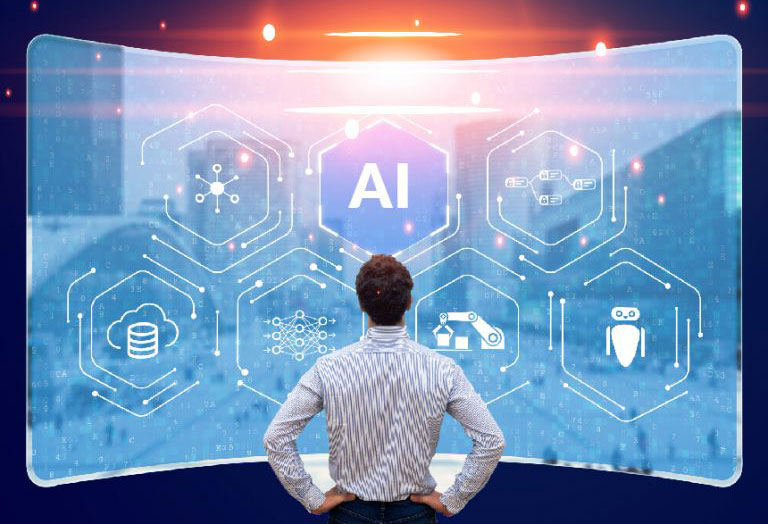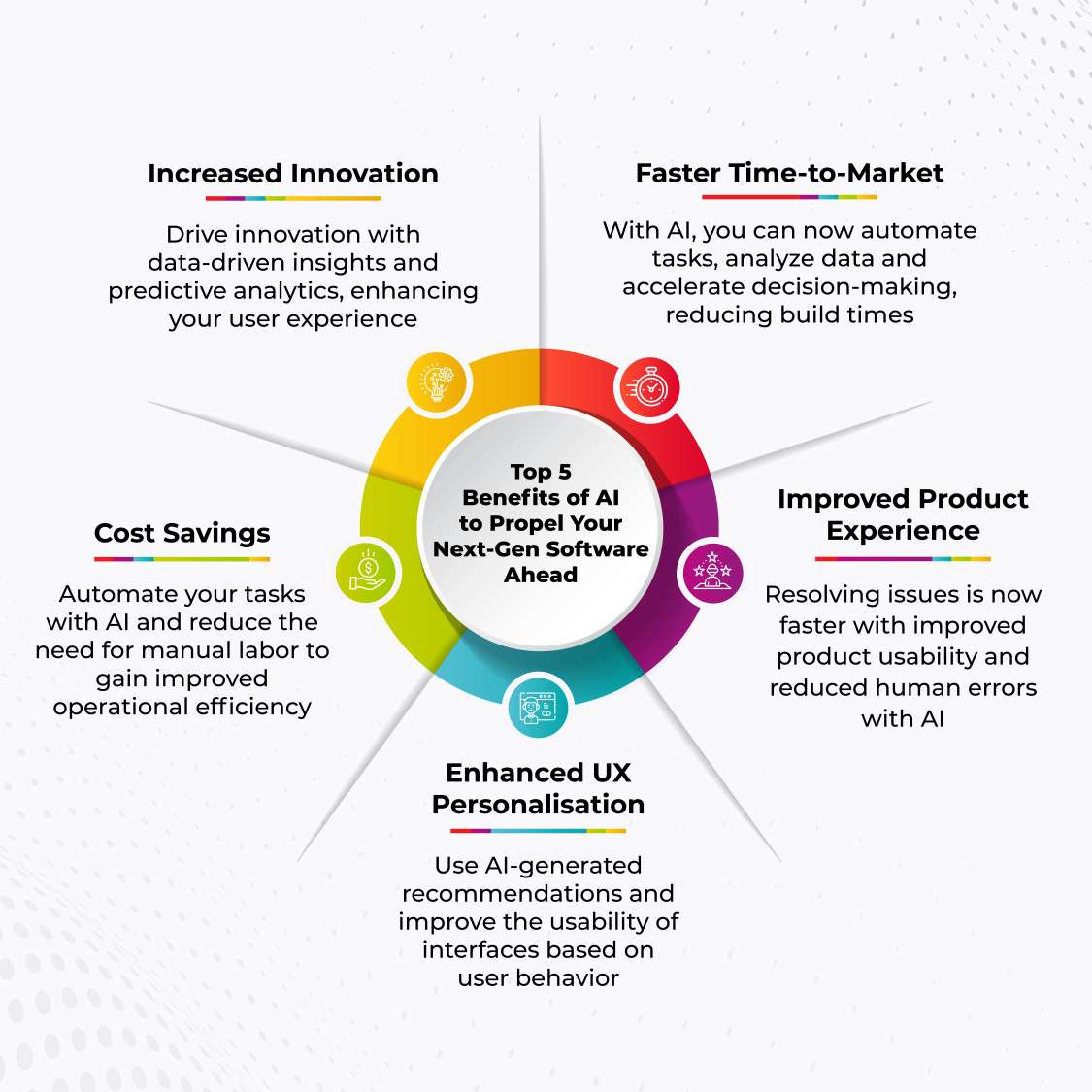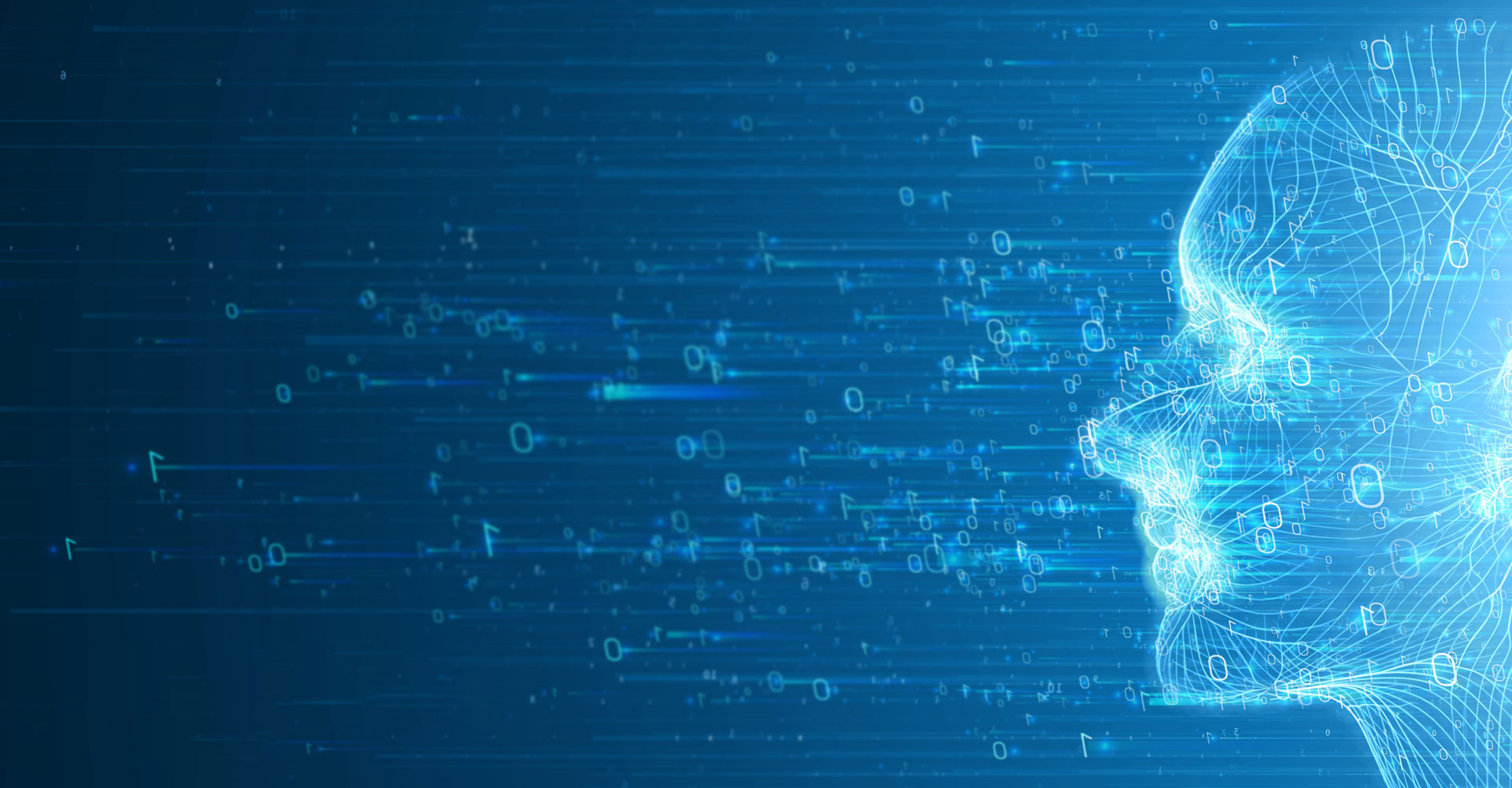Artificial Intelligence For Product Development

Artificial intelligence (AI) is speedily transforming the world of product development. By allowing machines to learn from experience, identify patterns, and make decisions, AI is helping companies create faster, more profitable, and more efficient products. With the application of AI in product development, product developers can automate many tedious, time-consuming tasks involved in product design and development, freeing up valuable time for creativity and innovation.
Now that AI technologies are more affordable and accessible, more companies are leveraging them to improve the quality of their products and streamline the development process.
Benefits of AI:

Out of the several benefits of Artificial Intelligence in product design and development, here are some of the major ones:
- Faster Time-to-Market: One of the major benefits of Artificial Intelligence in product design and development is the ability to speed up the development process. AI algorithms can accurately analyze large amounts of data and generate insights that can inform product design decisions. This enables companies to create prototypes faster and work on designs quickly. As a result, they can bring products to market much faster than before, gaining a competitive edge in the marketplace.
- Improved Product Quality: AI algorithms can analyze customer feedback, usage data, and other relevant data sources to identify issues with existing products and suggest improvements. By incorporating AI, companies can identify design flaws early on in the development process and make necessary changes so that the final product meets customer expectations. This leads to higher product quality and increased customer satisfaction.
- Cost Savings: AI in product development helps companies save a hefty sum by reducing the need for human resources in the product development process. AI algorithms can automate certain tasks, such as data analysis and product testing, which would otherwise require significant manual labor. This allows companies to reduce costs associated with hiring and training new employees while improving overall efficiency.
- Enhanced Customization: AI algorithms can also help companies tailor products to specific customer needs. By analyzing customer data, AI can identify patterns in customer behavior and preferences, which can inform product design decisions. This leads to more personalized products that meet the unique needs of individual customers.
- Increased Innovation: Finally, AI can help companies come up with new and innovative product ideas. By analyzing market trends, customer feedback, and other data sources, AI can identify gaps in the market and suggest new product concepts. This leads to increased innovation, which can drive growth and success in the marketplace.
Examples of AI in Product Development
Artificial intelligence is being used in a vast range of industries, including product development, due to the benefits of Artificial Intelligence in product design and development. From personalized recommendations to quality control and predictive maintenance, AI is transforming the way companies design and produce products. Mentioned below are some examples of how AI is being used in product development:
Amazon uses AI algorithms to analyze customer data and provide personalized recommendations for products. This technology allows the company to improve the user experience, boost customer engagement, and ultimately drive sales.
Similarly, Netflix uses AI to suggest TV shows and movies based on the viewing history of customers and ratings. The AI algorithms analyze the customer’s preferences to provide personalized recommendations, which improves the overall user experience and keeps customers engaged with the platform.
BMW uses AI-powered computer vision to inspect car parts for defects during the production process. The AI algorithms analyze the images of the parts to identify any defects, which allows the company to identify and correct issues early on in the process, reducing waste and improving overall quality.
Another key area where AI is being applied in product development is in customer feedback analysis. AI algorithms can be used to examine customer feedback and sentiment to identify product improvement areas. For example, the footwear company, Under Armour uses AI to analyze customer feedback to identify common complaints or issues with their products. This helps the company to improve the design and functionality of its products, leading to improved levels of customer satisfaction and loyalty.
By providing personalized recommendations, optimizing design, improving quality control, predicting maintenance needs, and analyzing customer feedback, AI is helping companies to create better products that meet the needs of their customers.
These are just a few examples highlighting AI in product development plays a vital role. As AI technology continues to evolve multifolds, we can expect more innovative applications in this field.
Challenges of AI Product Development
Although AI has given a new boost to product development, it comes with a bunch of challenges. Here are some of the key challenges of AI product development:
- Data quality: AI algorithms require large amounts of high-quality data to work effectively. Companies must ensure that the data they are using is accurate, clean, and relevant.
- Skillset: Dealing with AI product development requires specialized skills, including data science, machine learning, and programming. Companies must invest in training and hiring the right talent to develop AI-based products.
- Integration: Integrating AI into existing product development processes can be challenging. Companies must ensure that AI systems are compatible with their existing infrastructure and can integrate seamlessly with other systems.
- Security and privacy: AI algorithms often work with sensitive data, including customer information and trade secrets. Companies should ensure that their AI systems are secure and comply with data privacy regulations.
- Cost: Developing AI-based products can be expensive, especially for smaller companies. Companies must carefully evaluate the costs and benefits of AI before investing in this technology.
Despite these challenges, companies that successfully integrate AI into their product development processes can reap significant benefits. Custom software development companies like BuzzyBrains are experts in this sector and help businesses integrate AI in their product design and development, overcoming the complexities.
Future Trends in AI Product Development
Product development is rapidly changing due to Artificial Intelligence, and new trends are emerging as the technology continues to evolve. Here are some of the most promising future trends in AI product development:
- Personalization: AI can help companies create personalized products that meet the unique demands of every customer. For example, by analyzing data on a customer’s buying history, browsing behavior, and preferences, AI algorithms can suggest customized product configurations, such as color, size, and features.
- Predictive Analytics: using AI in product development enables help companies predict consumer demand for specific products for better inventory management.
- Augmented Reality: With the correct use of AI, companies can create immersive product experiences using augmented reality (AR) technology. AR can enable customers to visualize products in their environment before making a purchase, improving their confidence in the product and reducing the likelihood of returns.
- Collaborative Design: AI eases collaborative product design and development by helping real-time communication and feedback between designers, engineers, and other stakeholders. This can help companies create better products faster and more efficiently.
- Autonomous Product Development: Companies can develop products autonomously without human intervention through Artificial Intelligence. This can involve using AI to generate new product ideas, design prototypes, and even manufacture products.
Sneak Peak into the best use of AI
Real-world examples of AI-enabled product development are abundant in various industries, from healthcare to retail and finance. Companies are leveraging AI technology to develop better products, increase efficiency, and improve customer satisfaction. Here are some case studies that highlight successful AI-enabled product development:
- Amazon’s Recommendation Engine: Amazon is a pioneer in using AI to improve the customer experience. Its recommendation engine uses machine learning algorithms to suggest products that customers are likely to buy based on their browsing behavior and purchase history. The recommendation engine has significantly increased Amazon’s sales and customer satisfaction.
- Pfizer’s Drug Discovery: Pharmaceutical giant Pfizer uses artificial intelligence to accelerate drug discovery. The company’s AI-enabled platform, named “Atomwise,” uses deep learning to analyze millions of potential drug compounds and identify promising candidates for further testing. This has helped Pfizer to develop new drugs faster and at a lower cost.
- Ford’s Autonomous Vehicles: Ford is leveraging AI technology to develop self-driving cars. The company’s autonomous vehicle division, Argo AI, uses machine learning to improve the vehicles’ decision-making capabilities, enabling them to navigate complex environments safely. Ford aims to launch its first self-driving vehicle in 2021.
- Adobe’s Content Creation: Adobe is using AI technology to develop new tools for content creators. Its AI-enabled platform, named “Adobe Sensei,” uses machine learning to analyze images, videos, and other types of content and suggest improvements. This has helped Adobe to develop new features for its Creative Cloud products, improving the productivity of content creators.
Conclusion:
The benefits of using Artificial Intelligence in product design and development are too significant to ignore. By improving accuracy, reducing costs, and enhancing the customer experience, AI is helping companies create products that are faster, cheaper, and more innovative than ever before. As AI technology continues to evolve and expand, we can surely expect to see even more exciting developments in the field of product development in the years to come.
BuzzyBrains is a leading AI and machine learning development company in India that has expertise in developing AI-based solutions for businesses. Our team of experienced experts understands the challenges businesses face in their AI journey and offers customized solutions to help them achieve their cloud goals.
Additionally, we are dedicated to building future-ready products with the power of IOT and AI algorithms to help clients optimize their cloud resources and ensure their cloud infrastructure performs at its best. We offer 24/7 support and proactive monitoring to identify and resolve any
